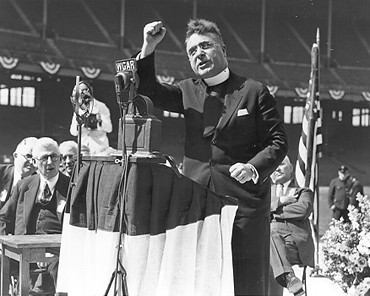
Father Coughlin first took to the airwaves in 1926, broadcasting weekly sermons over the radio. By the early 1930s the content of his broadcasts had shifted from theology to economics and politics. Just as the rest of the nation was obsessed by matters economic and political in the aftermath of the Depression, so too was Father Coughlin.
He began as an early Roosevelt supporter, coining a famous expression, that the nation's choice was between "Roosevelt or ruin." Later in the 1930s he turned against FDR and became one of the president's harshest critics. His program of "social justice" was a very radical challenge to unbridled capitalism and to many of the political institutions of his day.
A modern writer, Donald Warren, describes Coughlin as an ardent anti-Communist who backed the fascist regimes of both Hitler and Mussolini, but is probably best-remembered for his anti-Semitic tirades. He labels him "the father of hate radio."
In Sinclair Lewis' novel, a Fr. Coughlin-like "religious" broadcaster not only promotes the presidential candidacy of the fascist Senator Buzz Windrip, but also, through his organized followers, provides the muscle to go with his drive to power.
The rival to Senator Windrip in public reverence was a political titan who seemed to have no itch for office—the Reverend Paul Peter Prang, of Persepolis, Indiana, Bishop of the Methodist Episcopal Church, a man perhaps ten years older than Windrip. His weekly radio address, at 2 P.M. every Saturday, was to millions the very oracle of God. So supernatural was this voice from the air that for it men delayed their golf, and women even postponed their Saturday afternoon contract bridge.. . .
To the pioneer Father Coughlin, Bishop Paul Peter Prang was as the Ford V-8 to the Model A.. . .
No man in history has ever had such an audience as Bishop Prang, nor so much apparent power. When he demanded that his auditors telegraph their congressmen to vote on a bill as he, Prang, ex cathedra and alone, without any college of cardinals, had been inspired to believe they ought to vote, then fifty thousand people would telephone, or drive through back-hill mud, to the nearest telegraph office and in His name give their commands to the government. ...
There was a theory around some place that Prang was only the humble voice of his vast organization, "The League of Forgotten Men." It was universally believed to have (though no firm of chartered accountants had yet examined its rolls) twenty-seven million members. ...Hither and yon, Bishop Prang, not as the still small voice of God but in lofty person, addressed audiences of twenty thousand persons at a time, in the larger cities all over the country, speaking in huge halls meant for prize-fighting, in cinema palaces, in armories, in baseball parks, in circus tents, while after the meetings his brisk assistants accepted membership applications and dues for the League of Forgotten Men. When his timid detractors hinted that this was all very romantic, very jolly and picturesque, but not particularly dignified, and Bishop Prang answered, "My Master delighted to speak in whatever vulgar assembly would listen to Him," no one dared answer him, "But you aren’t your Master—not yet."
Scary stuff in a time when we have a House Majority leader telling the Washington Times that an "out of control" judiciary has imposed "a separation of church and state that's nowhere in the Constitution." This stuff keeps on coming back.
Poignant, at least for me, is Lewis's picture of US Christianity providing no defense whatever against aggressive fascism. As repression takes hold in the protagonist Doremus Jessup's small Vermont town, he visits the local Episcopal Church. The well-known prayers merely saddened him:
The lovely, familiar old ritual seemed meaningless to him now, with no more pertinence to a life menaced by Buzz Windrip and his Minute Men, no more comfort for having lost his own deep pride in being an American, than a stage revival of an equally lovely and familiar Elizabethan play. ...However exalted [the priest] himself might be, most of the congregation were Yorkshire pudding. ...the whole place smelled to Doremus of stale muffins.
I have to wonder, has "mainstream" Protestantism any more moral authority or backbone than the class-bound, conventional Christianity Lewis portrays here?
1 comment:
This is blogwhoring to some extent, but it's germane. We had a thread about liberals and faith on Marching Orders a couple of weeks ago, before the judicial story broke, and I'd be interested to hear what folks thought about the comments and linked stories.
Post a Comment